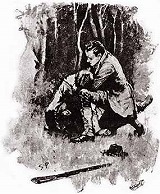
Mr. James McCarthy, the only son of the deceased, was then called and gave evidence as follows: “I had been away from home for three days at Bristol, and had only just returned upon the morning of last Monday, the 3d. My father was absent from home at the time of my arrival, and I was informed by the maid that he had driven over to Ross with John Cobb, the groom. Shortly after my return I heard the wheels of his trap in the yard, and, looking out of my window, I saw him get out and walk rapidly out of the yard, though I was not aware in which direction he was going. I then took my gun and strolled out in the direction of the Boscombe Pool, with the intention of visiting the rabbit-warren which is upon the other side. On my way I saw William Crowder, the game-keeper, as he had stated in his evidence; but he is mistaken in thinking that I was following my father. I had no idea that he was in front of me. When about a hundred yards from the pool I heard a cry of ‘Cooee!’ which was a usual signal between my father and myself. I then hurried forward, and found him standing by the pool. He appeared to be much surprised at seeing me and asked me rather roughly what I was doing there. A conversation ensued which led to high words and almost to blows, for my father was a man of a very violent temper. Seeing that his passion was becoming ungovernable, I left him and returned towards Hatherley Farm. I had not gone more than 150 yards, however, when I heard a hideous outcry behind me, which caused me to run back again. I found my father expiring upon the ground, with his head terribly injured. I dropped my gun and held him in my arms, but he almost instantly expired. I knelt beside him for some minutes, and then made my way to Mr. Turner’s lodge-keeper, his house being the nearest, to ask for assistance. I saw no one near my father when I returned, and I have no idea how he came by his injuries. He was not a popular man, being somewhat cold and forbidding in his manners; but he had, as far as I know, no active enemies. I know nothing further of the matter.”

The Coroner: Did your father make any statement to you before he died?
Witness: He mumbled a few words, but I could only catch some allusion to a rat.
The Coroner: What did you understand by that?
Witness: It conveyed no meaning to me. I thought that he was delirious.
The Coroner: What was the point upon which you and your father had this final quarrel?
Witness: I should prefer not to answer.
The Coroner: I am afraid that I must press it.
Witness: It is really impossible for me to tell you. I can assure you that it has nothing to do with the sad tragedy which followed.
The Coroner: That is for the court to decide. I need not point out to you that your refusal to answer will prejudice your case considerably in any future proceedings which may arise. Witness: I must still refuse.
The Coroner: I understand that the cry of “Cooee” was a common signal between you and your father?
Witness: It was.
The Coroner: How was it, then, that he uttered it before he saw you, and before he even knew that you had returned from Bristol?
Witness (with considerable confusion): I do not know.
A Juryman: Did you see nothing which aroused your suspicions when you returned on hearing the cry and found your father fatally injured?
Witness: Nothing definite.
The Coroner: What do you mean?



